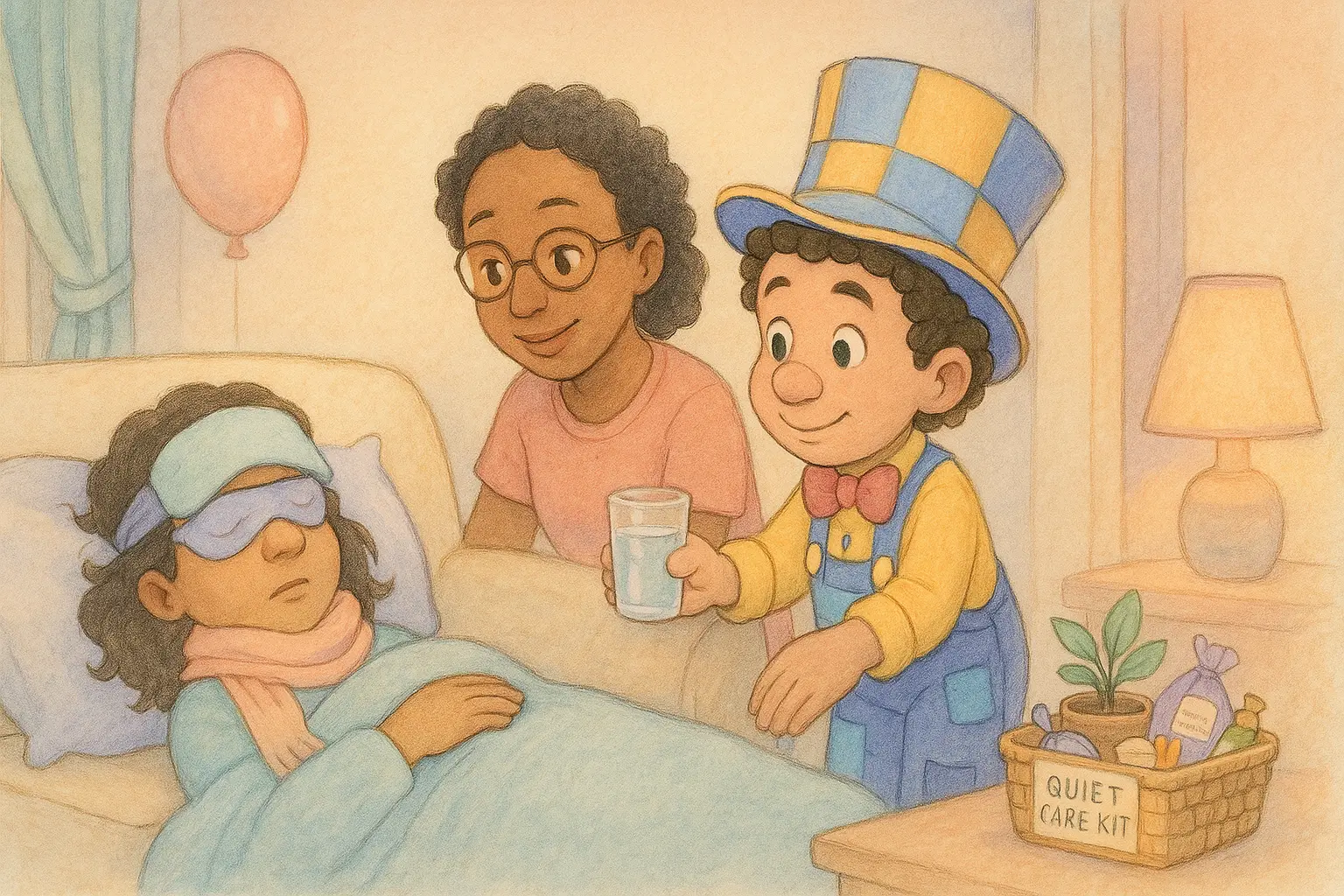Kaci was a brilliant young lady with golden brown skin that glowed like warm toast and a smile that could brighten a rainy morning. She wore glasses that made her look extra wise, stood taller than most—especially taller than Pockets—and she loved people so much she even prayed for them when they needed a little extra sunshine. Kaci was a hard worker with a happy heart.
Pockets worked in the same place as Kaci, just in a different department. He was the kind of person who always asked, “Are you okay?” and meant it. He kept helpful little things in his pockets—tissues, stickers, snacks, and notes that said “You can do it!” Most days, Kaci and Pockets only had time to wave and say, “Hi… bye!” as they hurried past each other.
One day, Kaci noticed something new: Pockets was quiet. His shoulders were low, and the zip-zap sparkle in his eyes was missing.
“Pockets, what’s going on?” Kaci asked gently.
Pockets sighed. “My dear friend Mukur isn’t feeling well. I hadn’t heard from her for days, and today I found out she has migraines.”
He looked confused and worried all at once. “I didn’t know what that was. I thought maybe she ate too many M&Ms and… um… ground them up?” He blinked, embarrassed.
Kaci couldn’t help giggling, but it was the kind of giggle that hugs your feelings, not one that hurts them. “Oh, Pockets,” she said, smiling. “Migraines aren’t candy. They’re very strong headaches. Bright lights and loud sounds can feel like thunder to someone with a migraine. Quiet and darkness help. So does water and rest.”
Pockets’ eyes got big. “So no M&Ms?”
“Not this time,” Kaci said, still smiling. “Maybe a soft blanket, a kind note, and a whisper.”
Pockets nodded, determined to help. He dashed to the store and picked out a big, shiny balloon and a talking “Get Well Soon!” card that sang a happy tune. Because, in Pockets’ mind, happy songs always help.
He tiptoed to Mukur’s door and knocked softly. When she opened, the room was dim and peaceful. She wore a cozy sweater and shaded her eyes with a soft scarf. Pockets stepped in, and the talking card sprang to life a little too loudly—“Get well sooooon!” it chirped.
Mukur winced. Pockets froze. “Oh no!” he whispered, hugging the card to muffle it. “I’m so sorry!”
Mukur gave him a tiny smile. “It’s okay, Pockets. I know you meant well.”
Pockets darted into the hallway, heart thumping. He called Kaci. “I messed up. The card is LOUD.”
Kaci’s voice was calm and kind. “That’s alright. You’re learning. Try this: turn off bright lights, pull the curtains a little, use a quiet voice. Offer water. Ask her what helps. And if you can, sit with her in the quiet. Quiet can be love.”
“And, um… no singing cards?”
“No singing cards,” Kaci replied, smiling through the phone. “I’ll say a little prayer for Mukur too.”
Pockets took a deep breath and went back in. He tucked the balloon by the door where it wouldn’t shine in her eyes. He slipped the singing card into his pocket and pressed it very still. Then he whispered, “May I turn this lamp down?” Mukur nodded. He drew the curtains a little more and brought her a glass of water.
“What helps when your head hurts?” Pockets asked.
Mukur’s voice was soft. “Quiet. Sips of water. Something cool on my forehead. And just… not being alone.”
Pockets nodded. He dipped a clean cloth in cool water and laid it gently across her forehead. Then he sat nearby, not too close, not too far. He didn’t chatter or jiggle his foot or open crinkly snacks. He just breathed slow and easy to keep the room calm.
After a while, he took out a simple note he’d written: “I care about you. I’m here.” He placed it where Mukur could see it when she wanted to.
“Thank you,” she whispered. “This helps.”
They stayed like that, quiet and kind. Pockets thought about Kaci, about how she knew when to laugh and when to listen. He whispered a small, hopeful wish into the quiet for Mukur to feel better soon.
Later, Kaci stopped by with a small basket: a soft eye mask, a gentle lavender sachet, and a little plant with round, hopeful leaves. She set it down lightly, waved with her fingers, and left again without a word. The kindness floated in the room like a calm breeze.
By afternoon, the storm in Mukur’s head began to pass. She took off the cool cloth and gave Pockets a sleepy smile. “You did it,” she said softly. “You learned what I needed.”
Pockets shook his head. “You helped me learn by telling me. I thought a singing card would be perfect. But now I know—quiet is kind.”
Mukur chuckled. “And migraines aren’t M&Ms.”
They both laughed a small, careful laugh.
The next week, when Mukur felt better, she visited Pockets and Kaci at work. Together they made a Quiet Care Kit for the break room: a basket with earplugs, soft masks, herbal tea, and little cards that read, “How can I help you today?” They even made a small poster that said:
“Ask. Listen. Care the way your friend needs.”
Now, when Pockets asked people “Are you okay?” he waited for the real answer. And when Kaci waved “Hi,” she often added, “Do you need anything?” The “hi and bye” became “hi, I’m here.”
As for Pockets and Mukur, their friendship grew stronger than any headache could ever be. He didn’t bring loud cards anymore. Sometimes he brought a doodle of a rainbow made of M’s—just to make her grin. And when anyone asked what true friendship looks like, they knew the answer:
It looks like listening. It sounds like quiet when quiet is needed. It feels like someone sitting beside you, caring in the way that helps you most.
And from that day on, whenever Pockets reached into his pockets, he made sure he had the most important thing of all—kindness that listens.
The END— — —


